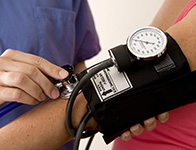Written by Sarah Wong, Staff Writer. A combination of L-arginine, Vitamin B6, vitamin B12, and folic acid significantly reduced deterioration in the endothelium of participating subjects compared to the placebo group.
 Atherosclerotic cardiovascular diseases are the leading cause of morbidity and mortality in the United States. Main risk factors for this disease include essential hypertension, high cholesterol, diabetes and cigarette smoking. However, B Vitamins such as B6, Folic Acid and B12 have also shown to be a key component of cardiovascular disease prevention because of their effect on the amino acid L-Arginine, which is converted to Nitric Oxide in the body 1-3. Nitric Oxide is the main mediator of endothelial cells, which line the innermost layer of a blood vessel 4. These cells, when healthy, are able to prevent the formation of arteriosclerosis. As long as B vitamins such as B6, Folic Acid and B12 are provided at sufficient levels, L-Arginine is able to be converted into Nitric Oxide 5,6. Endothelial dysfunction occurs when these cells are not functioning properly and can directly be linked to a decrease in Nitric Oxide production.
Atherosclerotic cardiovascular diseases are the leading cause of morbidity and mortality in the United States. Main risk factors for this disease include essential hypertension, high cholesterol, diabetes and cigarette smoking. However, B Vitamins such as B6, Folic Acid and B12 have also shown to be a key component of cardiovascular disease prevention because of their effect on the amino acid L-Arginine, which is converted to Nitric Oxide in the body 1-3. Nitric Oxide is the main mediator of endothelial cells, which line the innermost layer of a blood vessel 4. These cells, when healthy, are able to prevent the formation of arteriosclerosis. As long as B vitamins such as B6, Folic Acid and B12 are provided at sufficient levels, L-Arginine is able to be converted into Nitric Oxide 5,6. Endothelial dysfunction occurs when these cells are not functioning properly and can directly be linked to a decrease in Nitric Oxide production.
A new study published in the European Journal of Nutrition examined this relationship between Nitric Oxide and B Vitamins by testing a dietetic product containing Vitamins B6, B12, Folic Acid and L-Arginine on Endothelial Dysfunction. This product, known as Telcor Arginin plus (TAP), was given as an intervention at 2 capsules daily, with daily amounts equaling 2.4 g of L-arginine, 3mg Vitamin B6, 0.4 mg Folic Acid and 2 micrograms of Vitamin B12.The study was a controlled interventional trial and was performed as a confirmatory, prospective, randomized, placebo-controlled, double blind, single center study.
The 81 eligible subjects were randomly selected to receive either the nutritional intervention (n=40) or a placebo with the same visual appearance as the intervention, but containing microcrystalline cellulose. In order to be selected for the trial, subjects had to be either male or female, ages 40 and to 65, have a mildly elevated systolic blood pressure (between 130-149 mmHg) and not receiving or requiring any antihypertensive drug therapy.
The intervention was given for three months, with 5 periodic visits in between. Of the 81 enrolled participants, 80 completed the study, resulting in 40 subjects for each group. During the first 3 months of supplementation, systolic blood pressure decreased significantly in both groups. However, at the 3–month mark of the study, and in between visits 3-5, the intervention group displayed a significant decrease in systolic blood pressure (9.24 mmHg vs. 5.39 mmHg) 7 (p<0.001). The deterioration in the endothelium of the intervention group was also significantly reduced compared to the placebo group (p=0.0349), demonstrating a significant improvement in the intervention group.
Overall, this type of dietetic intervention was proven to be effective, well tolerated and safe. This study highlights the importance of continued investigation for nutritional therapies and their effects on blood pressure.
Source: Menzel, Daniel, et al. “l-Arginine and B vitamins improve endothelial function in subjects with mild to moderate blood pressure elevation.” European Journal of Nutrition (2016): 1-12.. doi:10.1007/s00394-016-1342-6
© The Author(s) 2016. (http://creativecommons.org/licenses/by/4.0/)
Posted April 4, 2017.
References:
- Luiking YC, Ten Have GA, Wolfe RR, Deutz NE. Arginine de novo and nitric oxide production in disease states. American Journal of Physiology-Endocrinology and Metabolism. 2012;303(10):E1177-E1189.
- Li Q, Yon J-Y, Cai H. Mechanisms and Consequences of eNOS Dysfunction in Hypertension. Journal of hypertension. 2015;33(6):1128.
- Tousoulis D, Kampoli A-M, Tentolouris Nikolaos Papageorgiou C, Stefanadis C. The role of nitric oxide on endothelial function. Current vascular pharmacology. 2012;10(1):4-18.
- Lei J, Vodovotz Y, Tzeng E, Billiar TR. Nitric oxide, a protective molecule in the cardiovascular system. Nitric Oxide. 2013;35:175-185.
- Bendall JK, Douglas G, McNeill E, Channon KM, Crabtree MJ. Tetrahydrobiopterin in cardiovascular health and disease. Antioxidants & redox signaling. 2014;20(18):3040-3077.
- Bode-Böger SM, Muke J, Surdacki A, Brabant G, Böger RH, Frölich JC. Oral L-arginine improves endothelial function in healthy individuals older than 70 years. Vascular Medicine. 2003;8(2):77-81.
- Fliege H, Rose M, Arck P, et al. The Perceived Stress Questionnaire (PSQ) reconsidered: validation and reference values from different clinical and healthy adult samples. Psychosomatic medicine. 2005;67(1):78-88.
